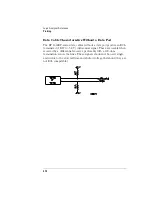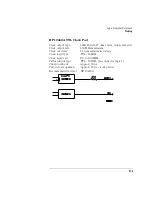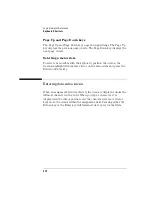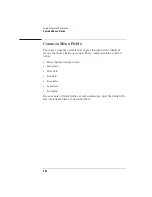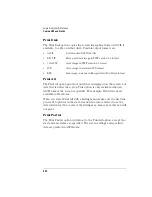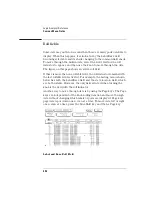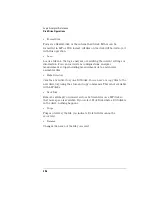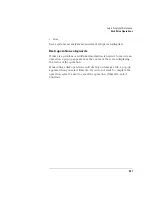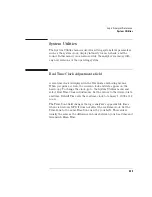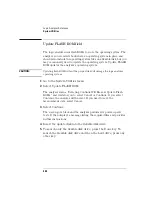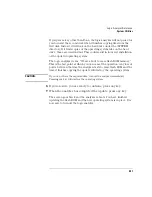
288
Logic Analyzer Reference
Disk Drive Operations
Autoload
The Autoload operation allows you to designate a set of configuration
files to be loaded automatically the next time the analyzer is turned on.
This allows you to change the default configuration of certain features
to one that better fits your needs. If both the hard drive and flexible
drive have autoload setups, only the setup on the flexible drive will be
used.
Autoload loads all of the files for a given base filename. If you want to
load only one type of file, rename that file or copy it to a separate name
and enable it as the current Autoload file. As long as Autoload is
enabled before the instrument is shut off, Autoload will remain enabled
when you turn on the instrument and load the configuration files.
Format
CAUTION:
Executing Format Disk permanently erases all existing information from the
disk. After formatting, there is no way to retrieve the original information.
The logic analyzer recognizes a variety of sector sizes for LIF disks.
However, it only creates 1024-byte sectors when formatting a LIF disk.
DOS disks always have 512-byte sectors.
The logic analyzer does not support track sparing during formatting. If
a bad track is found, the disk is considered bad. If a disk has been
formatted elsewhere with track sparing, it will be read successfully.
When formatting a disk, the DISK ERROR message appears if the disk
is unformatted. This is normal, and you can safely continue the format
process.
Summary of Contents for 1670E Series
Page 6: ...6 In This Book...
Page 26: ...26 Contents...
Page 27: ...27 Section 1 Logic Analyzer...
Page 28: ...28...
Page 29: ...29 1 Logic Analyzer Overview...
Page 39: ...39 2 Connecting Peripherals...
Page 49: ...49 3 Using the Logic Analyzer...
Page 72: ...72 Using the Logic Analyzer The Inverse Assembler...
Page 73: ...73 4 Using the Trigger Menu...
Page 101: ...101 5 Using the Oscilloscope...
Page 151: ...151 6 Using the Pattern Generator...
Page 199: ...199 7 Triggering Examples...
Page 237: ...237 8 File Management...
Page 249: ...249 9 Logic Analyzer Reference...
Page 360: ...360 Logic Analyzer Reference The Compare Menu...
Page 361: ...361 10 System Performance Analysis SPA Software...
Page 397: ...397 11 Logic Analyzer Concepts...
Page 430: ...430 Logic Analyzer Concepts The Analyzer Hardware Oscilloscope board theory Oscilloscope board...
Page 439: ...439 12 Troubleshooting the Logic Analyzer...
Page 455: ...455 13 Specifications...
Page 471: ...471 14 Operator s Service...
Page 479: ...479 Operator s Service Troubleshooting Troubleshooting Flowchart 2...
Page 491: ...491 Section 2 LAN...
Page 492: ...492...
Page 493: ...493 15 Introducing the LAN Interface...
Page 497: ...497 16 Connecting and Configuring the LAN...
Page 506: ...506 Connecting and Configuring the LAN Connecting and Configuring the LAN...
Page 507: ...507 17 Accessing the Logic Analyzer File System Using the LAN...
Page 515: ...515 18 Using the LAN s X Window Interface...
Page 527: ...527 19 Retrieving and Restoring Data Using the LAN...
Page 539: ...539 20 Programming the Logic Analyzer Using the LAN...
Page 546: ...546 Programming the Logic Analyzer Using the LAN Programming the Logic Analyzer Using the LAN...
Page 547: ...547 21 LAN Concepts...
Page 555: ...555 22 Troubleshooting the LAN Connection...
Page 580: ...580 Troubleshooting the LAN Connection Getting Service Support...
Page 581: ...581 Section 3 Symbol Utility...
Page 582: ...582...
Page 583: ...583 23 Symbol Utility Introduction...
Page 588: ...588 Symbol Utility Introduction Symbol Utility Introduction...
Page 589: ...589 24 Getting Started with the Symbol Utility...
Page 597: ...597 25 Using the Symbol Utility...
Page 609: ...609 26 Symbol Utility Features and Functions...

